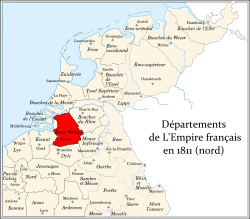Deux-Nèthes
Deux-Nèthes ([dø.nɛt], Dutch: Twee Neten) was a department of the First French Republic and of the First French Empire in present-day Belgium and the Netherlands. It was named after two branches of the river Nete (Grote Nete and Kleine Nete). The southern part of its territory corresponds more or less with the present-day Belgian province of Antwerp.[2] It was created on 1 October 1795, when the Austrian Netherlands were officially annexed by the French Republic[3]. Its territory was the northern part of the former duchy of Brabant. After the annexation of the Kingdom of Holland in 1810, the department was expanded with the western half of the present-day Dutch province of North Brabant.
Department of Deux-Nèthes Département des Deux-Nèthes (fr) Departement Twee Neten (nl) | |||||||||||
|---|---|---|---|---|---|---|---|---|---|---|---|
| 1795–1814 | |||||||||||
.svg.png) | |||||||||||
 Deux-Nèthes and other annexed departments | |||||||||||
| Status | Department of the French First Republic and the French First Empire | ||||||||||
| Chef-lieu | Anvers 51°13′N 4°24′E | ||||||||||
| Official languages | French | ||||||||||
| Common languages | Dutch | ||||||||||
| Historical era | French Revolutionary Wars | ||||||||||
• Creation | 1 October 1795 | ||||||||||
• Arrondissement of Bréda incorporated | 15 May 1810 | ||||||||||
• Treaty of Paris, disestablished | 30 May 1814 | ||||||||||
| Area | |||||||||||
| 1812[1] | 4,153 km2 (1,603 sq mi) | ||||||||||
| Population | |||||||||||
• 1812[1] | 367,184[1] | ||||||||||
| |||||||||||
| Today part of | |||||||||||
The Chef-lieu of the department was Antwerp (Anvers in French). The department was subdivided into the following four arrondissements and cantons:
- Anvers: Anvers (4 cantons), Brecht, Ekeren, Kontich, Wilrijk and Zandhoven.
- Bréda: Bergues-sur-le-Zon, Bréda, Ginneken, Oosterhout, Oudenbosch, Rosendael and Zevenbergen.
- Malines: Duffel, Heyst-sur-la-Montagne, Lierre, Malines (2 cantons) and Puers.
- Turnhout: Arendonk, Herentals, Hoogstraten, Mol, Turnhout and Westerlo.
After Napoleon was defeated in 1814, the department became part of the United Kingdom of the Netherlands as the province of Antwerp.[4]
Administration
Prefects
The Prefect was the highest state representative in the department.
| Term start | Term end | Office holder |
|---|---|---|
| 2 March 1800[5] | 29 July 1805 | Charles Joseph Fortuné d'Herbouville |
| 29 July 1805[6] | 29 March 1809 | Charles Cochon de Lapparent |
| 29 March 1809[7] | 12 March 1813 | Marc René Marie Voyer de Paulmy d'Argenson |
| 12 March 1813[8] | 30 May 1814 | Jacques Fortunat Savoye-Rollin |
Secretaries General
The Secretary General was the deputy to the Prefect.
| Term start | Term end | Office holder |
|---|---|---|
| 26 April 1800 | ?? ?? 1805 | Jacques Ambroise Rialle |
| ?? ?? 1805 | 30 May 1814 | Jacques-Chrisostôme Jullien d'Aguilhan |
Subprefects of Anvers
The office of Subprefect of Anvers was held by the Prefect until 1811.
| Term start | Term end | Office holder |
|---|---|---|
| 14 January 1811[9] | 14 February 1812 | Guislain De Loose |
| 14 February 1812[9] | 30 May 1814 | Baillet |
Subprefects of Bréda
This subprefecture was created in 1810 and suppressed a month later.
| Term start | Term end | Office holder |
|---|---|---|
| 5 May 1810[9] | 15 May 1810 | Peppe |
Subprefects of Malines
| Term start | Term end | Office holder |
|---|---|---|
| 25 April 1800[9] | 8 July 1802 | Jean Henri Pierre Van den Branden de Riette |
| 8 July 1802[9] | 30 May 1814 | Devargny |
Subprefects of Turnhout
| Term start | Term end | Office holder |
|---|---|---|
| 25 April 1800[9] | 30 May 1814 | Mesmaekers |
References
- Almanach Impérial. Imprimerie de Sa Majesté. 1812. p. 442.
- Herbouville, Charles-Joseph-Fortuné marquis d'; France. Ministère de l'intérieur (1802), Tableau statistique du Département des Deux-Nèthes, s.n, retrieved 29 December 2018
- Duvergier, Jean-Baptiste (1835). Collection complète des lois, décrets, ordonnances, réglemens et avis du Conseil d'état, t. 8. p. 300.
- "The Cathedral, Mechlin, Belgium". The Advocate. XXXVII (1922). Victoria, Australia. 25 November 1905. p. 13. Retrieved 29 December 2018 – via National Library of Australia. ,... Napoleon I. had its fortifications razed in 1804, and made it the capital of the French "Departement des deux Nethes," until 1814, when it was comprised in the Kingdom of the Netherlands, and it finally became part of Belgium in 1830...
- Archives Nationales. "HERBOUVILLE, Charles Joseph Fortuné d'". francearchives.fr. Retrieved 7 July 2019.
- Archives Nationales. "COCHON DE LAPPARENT, Charles". francearchives.fr. Retrieved 7 July 2019.
- Archives Nationales. "VOYER DE PAULMY D'ARGENSON, Marc René Marie de". francearchives.fr. Retrieved 7 July 2019.
- Archives Nationales. "SAVOYE-ROLLIN, Jacques Fortunat". francearchives.fr. Retrieved 7 July 2019.
- Tulard, Jean & Marie-José (2014). Napoléon et 40 millions de sujets: La centralisation et le premier empire. p. 335. ISBN 9791021001480.